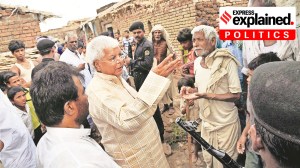A city’s capital punishment
It was a bizarre media event. A few autorickshaw drivers had called up a newspaper office. They had devised a way of tampering with electron...

It was a bizarre media event. A few autorickshaw drivers had called up a newspaper office. They had devised a way of tampering with electronic meters. In a nondescript part of Delhi, where they had parked their three-wheelers, they explained how this could be done. It was simple. Every time you pressed the horn, the meter jumped.
Had a few teenagers made this discovery, it would have made sense. But this was not the case here. The autorickshaw drivers just wanted to highlight the point that changing over to electronic meters is no guarantee against tampering. They wanted the old mechanical meters to stay.
If you choose to probe this further, you would have found that these three-wheeler drivers were sponsored by a firm manufacturing mechanical meters. In fact, this firm enjoys a monopoly in the mechanical meter trade. Once the autorickshaw fleet switches over to electronic meters, its business will be in the doldrums.
This story is very typical of the nation’s Capital where vested interests of every description abound. Their single-point agenda is to stand in the way of any new measure, any technological improvement that could greatly improve the quality of life.
Electronic meters would not have been designed and marketed in the new millennium if they did not meet a felt need. After all, in Delhi, as in every other city in the country, taxi drivers and autorickshaw wallahs have had this running battle with commuters over ‘‘the right fare’’. Kolkata, with its organised labour force, had even delayed the arrival of computers with their vociferous anti-automation slogans. Mumbai, too, has experienced similar battles. But Delhi with its powerful political patrons, has proved to be the most resistant to such change.
Logically, it does not make sense to obstruct the introduction of people-friendly technology. After all, today in the year 2002, it is not easy to dupe a citizen on the benefits of new technology, by spreading canards, being obstinate, or just delaying things for as long as possible.
Ideally, a manufacturer with vision will adapt to the changing scenario by redesigning his factory to produce commodities that are presently in demand. A driver of a three-wheeler would realise that the days of extracting more money by tampering with meters are over.
Elsewhere in the world people know that indulging in such easily-identifiable forms of petty corruption does not pay. Unfortunately, this general realisation has yet to dawn on many cities in this country, including its Capital. Unfortunately, too, senior politicians, who should have been ardent advocates of change that has the potential of improving peoples’ lives, invariably opt for fighting it.
The responses of the BJP’s leaders to the party’s rout at the recent municipal corporation polls is a case in point. They have been busy blaming former Union minister for housing, Jagmohan, because he had tried to clean by Delhi by demolishing unauthorised constructions. They have blamed the environmentalists because they had tried to clean up the city’s air and take on the diesel lobby. They have blamed Union Finance Minister Yashwant Sinha because he reduced subsidies on LPG cylinder in his recent Budget.
None of them seem to realise that it is their own bad governance that has let them down, not the reasons they cite. The Budget, for instance, was presented just three weeks before the civic polls. The BJP had run the civic body for five years. So the argument that the ‘‘good work’’ done for five years was undone by the country’s finance minister with one price hike, doesn’t say very much for this so-called ‘‘good work’’. For how long do these politicians imagine they can fool the electorate in this manner?
It’s time, then, to say goodbye to the politics of dole and influence-peddling. Today, even those living in the slums of a city are wise enough not to demand freebies. They want governance. And governance is all about addressing the larger issues of daily existence.



- 01
- 02
- 03
- 04
- 05




























